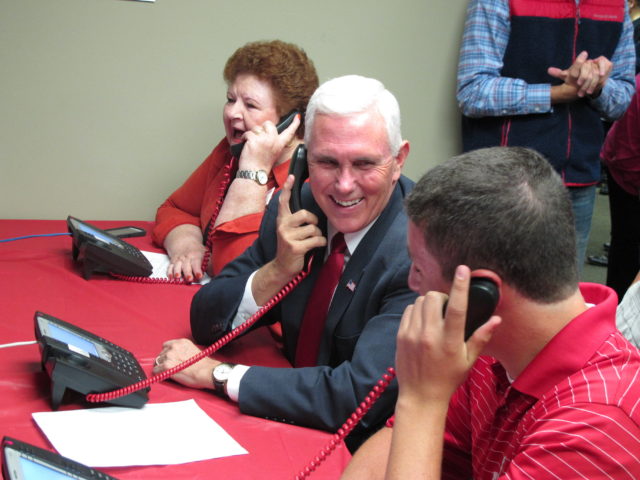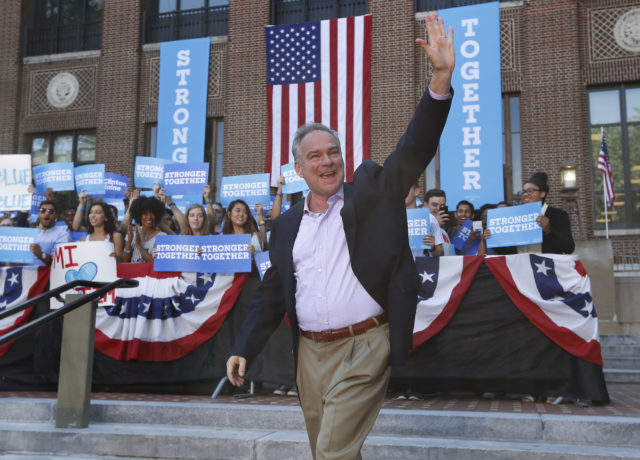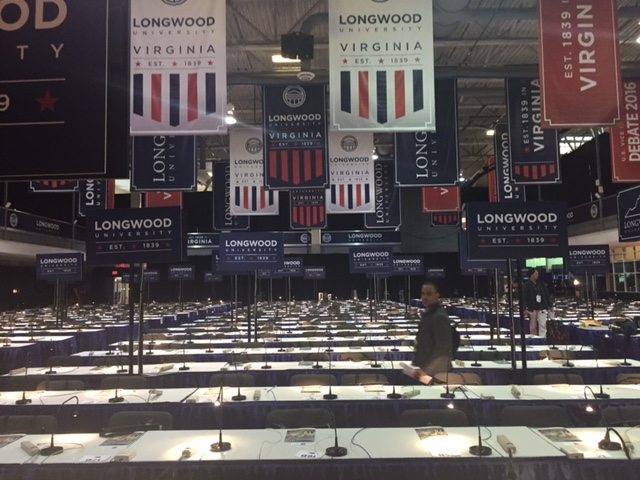Attack and parry — that’s what most experts expect in the vice presidential debate between Republican Mike Pence and Democrat Tim Kaine.

Sign in coffee shop promoting the vice presidential debate in Farmviille, VA. Democrat Tim Kaine and Republican Mike Pence face-off Oct. 4, 2016 (VOA-Katherine Gypson)
The duo have multiple responsibilities as they face off: vigorously exploit their opponents’ vulnerabilities on policy and character; deftly defend their presidential candidate from those attacks; and demonstrate that they are suitably qualified to become president if the circumstances demand.
That last responsibility may be the best reason to watch the debate. At age 70, Donald Trump would be the oldest person elected president. The 68-year old Hillary Clinton would be the second oldest, if elected. What we know about their medical histories is limited to what they want us to know.
As well, the debate may give us a glimpse into the possible political futures of Kaine, a U.S. senator from Virginia and Pence, the governor of Indiana.
If nothing else, we will see how they do for 90 minutes in the spotlight before they fade back into the shadows of the campaign.
Pence v. Kaine: Battle of the Normals
Todd S. Purdum – Politico
Republican vice presidential candidate Indiana Gov. Mike Pence makes phone calls along with campaign volunteers at a Republican party office on Sept. 27, 2016, in Fitchburg, Wis. (AP)
Tuesday night’s debate is the moment when we’re most likely to hear substantive arguments about governance and the future of America, and get the best look at the campaigns’ actual platform and ideas. And yet, a vice presidential face-off has probably never mattered less. In part, that’s because the entire campaign has been so polarizing—and largely substance-free—that it’s hard to imagine there are many voters waiting to see just how Pence or Kaine makes them feel about their party’s ticket….
Time and again since the Republican National Convention, it has fallen to Pence to defend, explain, amend or elaborate on controversial comments by his running mate, and it’s reasonable to assume he’ll once again be on the defensive in the debate. That’s a bit of an issue with Kaine, too, because there has been daylight between him and Clinton on issues like abortion and trade, albeit not such a wide gap.
The Vice Presidential Debate Is a Window into the Future of American Politics
Brian Beutler – The New Republic
Democratic vice presidential candidate, Sen. Tim Kaine, D-Va. waves as he arrives for a campaign rally at the University of Michigan in Ann Arbor, Mich., Tuesday, Sept. 13, 2016. (AP Photo/Paul Sancya)
Kaine fits neatly on the continuum of the Democratic Party’s slow, careful drift leftward. He has been a staunch advocate for housing and other economic rights for the poor since his days as an attorney, but he has not been the aggressive champion of welfare state and regulatory reforms. Kaine is a devout Catholic who has supported abortion restrictions in the past, but toes a pro-choice line as the Democrats’ vice presidential nominee. He fits neatly enough within the Obama tradition that in 2008 he was on Obama’s VP short list, but was passed over for being too young and lacking Capitol Hill experience.
Pence, by contrast, suggests the future of Republican Party politics will invert the pre-Trump formula, blending overt appeals to white supremacy with understated efforts to crush the New Deal. To the extent that VP’s are supposed to say something about the party and its future, Pence is the embodiment of how the GOP has tried to massage the Trump phenomenon: by running cover for him within the party and among the party’s elites while preserving the old regime in partial exile so that if Trump wins, they can jam through standard conservative movement legislation, and if he loses, they can get the old band together.
Don’t Skip the Vice Presidential Debate
Andrew Hammond – USA Today
Yet the vice presidential race matters greatly to both domestic and international audiences.
Media center for the vice presidential debate at Longwood University in Farmville, VA. Republican Mike Pence and Democrat Tim Kaine face-off on Oct. 4, 2016 (VOA-Katherine Gypson)
In part, this is because of the increased status and resourcing of the vice presidential office in recent decades. This has been epitomized in the last quarter of a century by the sizeable influence of the last three incumbents: Joe Biden, Dick Cheney and Al Gore….
To be sure, part of the reason all three vice presidents were influential was the generally close relationships they enjoyed in office with Barack Obama, George W. Bush and Bill Clinton respectively….Kaine or Pence will inherit this model of the vice presidency and the winner likely will be a significant player in the new administration.




